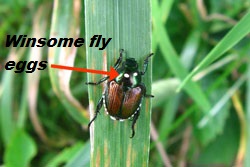Home → Landscapes → Managing Pests
Managing Pests
Quick Tips
- Know your enemy. Ninety-eight percent of all insects are benign or beneficial. Spiders, ground beetles and lady beetles to name a few. They can help fight your pest battles. Learn to recognize and protect them. Maybe even buy them! Beneficial Insects & Spiders
- Think before you treat. Identify your pest without a doubt. Realize a few pests are okay—plants can withstand some damage. GotPests.org can help with pest ID.
- Use non-pesticide controls first. Try handpicking weeds, flushing insects with water and fighting bugs with bugs.
- Spot treat. Use pesticides only when pests increase beyond acceptable levels, then spot treat only. Broadcast treatments cause too much collateral damage to beneficial orgamisms.
- Go native. Select plants that bugs don't like. Try native plants, they're survivors. Native or non-native, pick plants that are suited to your region and soil condition. The University of Connecticut Plant Database lists the "liabilities" of plants which helps you avoid problem trees and shrubs.
- Mind your soil. Keep your soil rich and fertile, with a proper pH.
- Rotate. In flower or vegetable gardens, rotate plants to disrupt the life cycle of pests.
- Get a headstart. Plant and harvest vegetables early. This will keep the plants strong and avoid peak insect activity. Also, most vegetable plants need lots of sun and water to help resist pest problems.